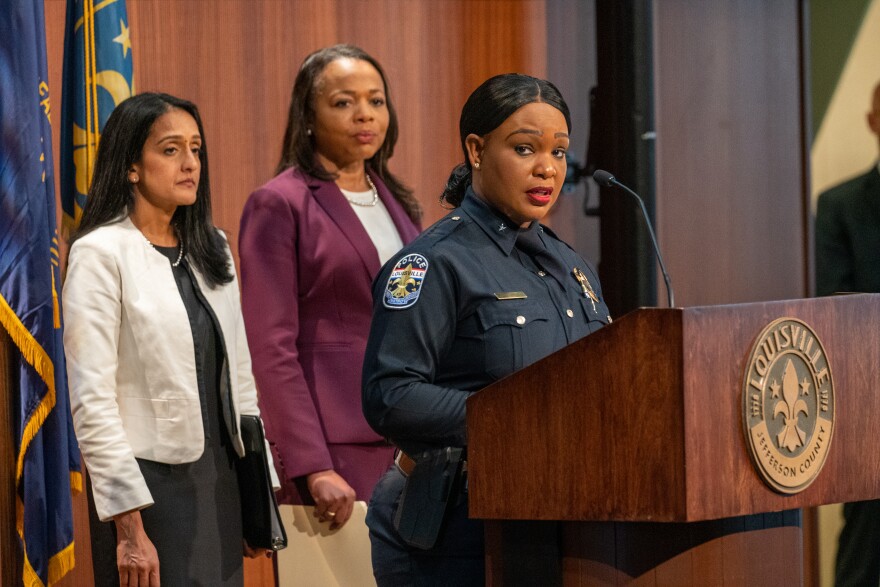The fraught relationship between police and community members, particularly from Black communities, reached a fever pitch during the 2020 protests over the police killing of Breonna Taylor. This March, the U.S. Department of Justice released the results of its investigation of the Louisville Metro Police Department. They identified a multi-year pattern of officer misconduct, civil rights abuses and "an aggressive style of policing" focused disproportionately on Black residents. Louisville officials are now negotiating a consent decree with the DOJ, which will serve as a roadmap for reform overseen by a federal judge.
Gwinn-Villaroel, who was officially named to the top leadership role on July 20, has come into the job promising to move LMPD toward a community policing model and repair community trust in the department. She recently sat down with LPM News to talk about her vision for the future of LMPD.
Police-community relations
During the 2020 racial justice protests, Gwinn-Villaroel was in Atlanta, where she had been a cop for more than 20 years. At the time, she was overseeing Atlanta PD’s training academy.
“So, I had all of the recruits and we were down there on the front lines actually engaged with other officers and the protesters,” she said.
Gwinn-Villaroel said her experiences in Atlanta during the protests, which were fueled by the police killing of Rayshard Brooks, were similar to what she’s learned about the demonstrations here in Louisville. The impact of the protests, she said, was also similar in each city.
“There were the same emotions, raw emotions, on both sides,” she said. “I saw the hurt, I saw the pain in the officers’ eyes to see that we were losing ground with the community.”
Then-Mayor Greg Fischer brought Erika Shields in from Atlanta in early 2021 with a mandate to make LMPD a model for reform and heal the department’s relationship with the community. Shields recruited Gwinn-Villaroel to come with her and be her second-in-command.
Gwinn-Villaroel became interim chief in January, when Shields resigned.
Moving forward, Gwinn-Villaroel said she plans to create new ways for LMPD to engage with members of the public, particularly young people. She meets with a youth advisory council, a group of 13 to 16-year-olds, every two weeks to talk about police-community interactions and other public safety issues in Louisville. Officers are currently getting training to speak with kids in Jefferson County Public Schools about avoiding gangs, a program known as GREAT.
Gwinn-Villaroel said she also wants to expand existing programs, such as the Police Activities League.
“There’s buy-in there [from officers],” she said. “I just need to make sure that we’re doing it and we’re doing it where it’s most effective.”
While Gwinn-Villaroel said she wants to engage with all of the communities across Louisville Metro, the department has put an emphasis on reaching Black communities. And Gwinn-Villaroel may be uniquely positioned to do that outreach.
At the press conference last month where he announced Gwinn-Villaroel as his pick, Mayor Craig Greenberg highlighted the fact that she’s the first Black woman to serve as the permanent chief of LMPD.
Gwinn-Villaroel said she wants to inspire “little Black princesses” and “little Black princes” to want to do great things.
“I’m hoping that if being a Black woman will help the community identify with me more readily in order to continue this process, that healing and bridging the gap of relationships and building that trust, then so be it,” she said.
Community policing
Gwinn-Villaroel said she hopes LMPD’s new initiatives for engaging with residents can help augment the larger work of moving the department toward a community policing model. She said it’s about increasing how often officers and residents casually interact.
“It’s not about always going to certain neighborhoods and we’re always trying to do an enforcement effort,” she said. “It’s about just being present.”
Each of LMPD’s eight divisions is reinstituting foot patrols, Gwinn-Villaroel said, requiring beat officers to get out of their vehicles and walk through neighborhoods or business corridors. She said she’s also using her position as chief to encourage officers to find more ways to connect with people.
“I want my officers to actually go to church when they’re on duty. Park that car. Go inside and stand in the back,” Gwinn-Villaroel said. “Not rushing out of the store, but just pausing for a minute and see if you can see somebody who is in need. ”
Gwinn-Villaroel spoke with District 7 Metro Council Member Paula McCraney on a recent episode of the city’s District Download podcast. During the taping, McCraney asked her what advice she would give to residents on how best to interact with police officers. Gwinn-Villaroel encouraged residents to “listen to what we’re saying.”
“That’s why we have the guns that come into play because, again, people are not listening,” Gwinn-Villaroel said in that interview.
Some people interpreted her comments as justifying the use of a weapon as an appropriate response to someone who doesn’t understand or doesn’t agree with an officer's order, and LPM News asked Gwinn-Villaroel to explain her comments.
“When people are not listening to one another and they are not utilizing proper conflict resolutions, that's when you have gunplay,” she responded. “Listen to the police officer. We're listening to you. Listen to the instructions so we can ensure that we have a successful encounter with one another.”
Reforming LMPD
The DOJ report highlighted a number of cases in which multiple LMPD supervisors cleared an officer of wrongdoing before an internal investigation found they had actually violated department policies. In one case, multiple supervisors did not raise any red flags after reviewing footage of an incident in which an officer grabbed a Black man by his dreadlocks and called him an animal.
Gwinn-Villaroel said LMPD is working on “making sure our supervisors are better equipped and trained to identify those concerns within the officers.” One concrete example she gave was a seven-month leadership course for LMPD sergeants created in partnership with the College of Business at the University of Louisville.
“Inserting those particular initiatives within the department to help the supervisors grow is where LMPD is right now,” she said.
Gwinn-Villaroel also said the department is utilizing an “early warning system” to help supervisors identify officers that are exhibiting behaviors that could lead to more serious misconduct down the line. LMPD previously claimed to be using an early warning system for years prior to 2020, but the Kentucky Center for Investigative Reporting found it was never activated.
Gwinn-Villaroel said the early warning system is not punitive. Officers who raise alerts are counseled by their supervisors or receive further training. As an example, she said an officer could be flagged if they use their gun or a non-lethal weapon multiple times in one month or if an officer receives multiple courtesy complaints in a short span of time.
“That is just another tool to assist our supervisors to understand who we have working for us and to actually address any concerns,” she said.
The DOJ is also likely to recommend strengthening civilian oversight as part of a consent decree. In 2020, city officials created a Civilian Review and Accountability Board that can independently investigate complaints against officers through the Office of Inspector General.
The city’s Inspector General, Ed Harness, has encountered some roadblocks to completing those investigations, including disagreements over access to police reports and body camera footage. Despite the setbacks, Gwinn-Villaroel promised LMPD would be fully cooperative, a message she said she’s passing down through the ranks.
“I want to continue to show my department that leadership is committed to ensuring that we are moving in a vane that the community understands we are not trying to resist that entity,” she said. “They are needed and the community has required it.”






